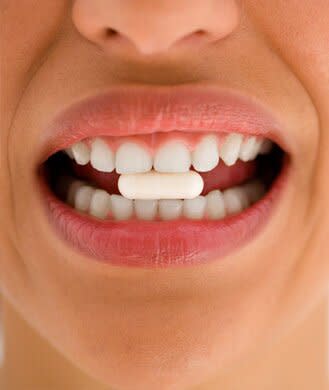Is Your Medicine Cabinet Widening Your Waistline?
Did you know that the medicine that's calming your anxiety or the one that's helping dull the pain from that toothache could be making you fat? So says Dr. Joseph Colella, weight loss expert, bariatric surgeon, and author of Skinny People Just Don't Get It.
We asked the doc to pinpoint four common medicines and their bulge-inducing side-effects. Read on to find out if any of them are in your medicine cabinets.
OTC Pain Killers

Next time you reach for a pill to cure common aches and pains, you may think twice.
"Another tricky and surprising class of medications that is an appetite stimulant is the group known as non-steroidal anti-inflammatory drugs or NSAIDS, commonly known as aspirin, Ibuprofen, and naproxen, to name just a few," Colella says. "These medications are often used for joint pain or arthritis and often result in a low grade gastritis or inflammation of the stomach. This irritation tends to simulate 'hunger pangs' which is why it's recommended you take these types of meds with food, thereby making you eat more."
Dr. Colella says if you absolutely must take one of these meds, you can also protect your stomach from inflammation with one of the many acid-reducing medications available.
Water Pills

While their name points to hydration, their effects are just the opposite.
"These medications, often used to treat high blood pressure, heart failure, and ankle swelling, have a tricky but disastrous impact on our appetite," Colella says. "They make us thirsty, and thirst is another one of the most potent appetite stimulants that we face."
The human brain is not good at "differentiating hunger from thirst" which sends us right to the refrigerator to quench the feeling with food. Dr. Colella recommends keeping a low-carb protein drink chilled and ready for action. "This way, you can solve both potential problems with one shot."
Sleeping Pills

Midnight snack, anyone? While they may help you get that recommended eight hours of sleep a night, they can also make you hungrier.
"Sleeping pills are another surprising appetite increaser. They work on the brain in a similar manner as some common sedatives like Valium and Xanax in that they accidentally stimulate the appetite center and make you convinced that you're hungry," Colella says. He likens it to a 'case of the munchies.' "The mechanism here is almost identical to those cravings," he adds.
Anti-Depressants

Your anti-anxiety meds may have a calming effect on your psyche, but a stimulating one on your appetite.
"One of the most commonly prescribed type of drugs is also one of the major offenders in sabotaging weight loss," Colella says. "As a frequent side effect of anti-depressants, we often see an increase in appetite shortly after the administration of the medications. And although increase in appetite is not cited as a side effect in the package inserts of many of these drugs, I often see it in my practice, especially in post-bariatric [weight loss] surgery patients."

